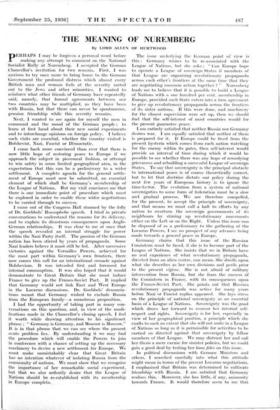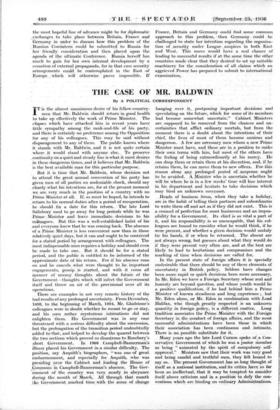THE MEANING OF NUREMBERG
By LORD ALLEN OF HURTWOOD
Next, I wanted to see again for myself the men in command and the mood of the GCrman people ; to learn at first hand about their new social experiments and to interchange opinions on foreign policy. I believe such visits are essential, whether the country visited is Bolshevist, Nazi, Fascist or Democratic.
I come back more convinced than ever that there is now little hope of restoring peace to Europe if we approach the subject in piecemeal fashion, or attempt to win safety in some limited geographical area, in the expectation that this . can be a preliminary to a wider settlement. A complete agenda for the general settle- ment of Europe must now be submitted, an essential element of which shall be Germany's membership of the League of Nations. But my visit convinces- me that there is one immediate point of procedure which must be explored in order to enable these wider negotiations to be carried through to success.
I came out of the Congress Hall stunned by the folly of Dr. Goebbels' Russophobe speech. I tried in private conversations to understand the reasons for its delivery, -and to explain its disastrous consequences upon Anglo- German relationships. It was clear to me 'at once that the speech revealed an internal struggle for power within the Nazi Party itself. The passion of the German nation- has been stirred by years of propaganda. Some Nazi leaders believe it must still be fed. After successive victories against the Versailles Powers, achieved for the most part within Germany's own frontiers, there now comes this call for an international crusade against Bolshevism. It was intended first and foremost for internal consumption.- It was alSo hoped that it would demonstrate to- Great Britain that she must induce France to give up the Franco-Soviet Pact. It implied that Germany would not link East and West Europe in the Locarno discussions. Dr. Goebbels' denuncia- tions meant .that Germany wished to exclude Russia from the. European family—a -monstrous proposition.
-I had the opportunity of -taking part in many con- versations on this question, and, in view of the modi- fications made in the Chancellor's closing speech, I feel it worth while drawing attention to his significant phrase : -," Germany is Germany, and Moscow is Moscow." It is in .that' phrase that we can see where the present acute problem lies: - By understanding it we may find the procedure which •will enable the Powers to join in conference with a chance of- setting up the necessary machinery to devise a new settlement for Europe. We must make unmistakably clear that Great Britain has - no intention whatever of- isolating-Russia -from the community of nations. We must show that we recognise the importance ..of her . remarkable :social experiment, but that we also ardently desire that the League of Nations should . be re-established with its membership in Europe complete. • - • The issue underlying the German point of view is this : Germany wishes to be re-associated with the League of Nations, but she asks : " Can Europe hope to operate a League of sovereign States if members of that League are organising revolutionary propaganda across each other's frontiers at the same time that they are negotiating common action together ? " Nuremberg leads me to believe that it is possible to build a League- Of Nations with a one hundred per cent. membership in Europe, provided each State enters into a firm agreement to give up revolutionary propaganda across the frontiers of its sister nations. If this were done, and machinery for the closest supervision were set up, then we should find that the self-interest of most countries would for the present guarantee peace.
I am entirely satisfied that neither Russia nor Germany desires war. I am equally satisfied that neither of them is prepared for it. If Europe could be freed from the present hysteria which comes from each nation watching for the enemy within its gates, then self-interest would provide an interval of time during which it would be possible to see whether there was any hope of remedying grievances and rebuilding a successful League of sovereign States. To say that sovereignty is the principal obstacle to international .peace is of course -theoretically correct, but to let that doctrine dictate our policy during the next few years of European history is to ignore the time-fa Germany claims that this issue of the Russian Comintern must be faced, if she is to become part of the League of Nations. She insists that we in Britain have no real experience of what revolutionary propaganda, directed from an alien centre, can mean. She dwells upon . what she describes as her own divisions and perils prior to the present regime. She is not afraid of military intervention from Russia, but she fears the success of the Comintern in France, with its consequences upon the Franco-Soviet Pact. She points out that Russian revolutionary propaganda was active for many years before Nazi or_ Fascist replies appeared. She lays stress on- the principle of national sovereignty as an essential basis of a League of Nations. Sovereignty was the goad which drove her forward to recover her internal self- respect and rights. Sovereignty is for her, especially 'in view of her geographical position, a principle which she exalts to such an extent that she will not unite in a League of Nations so long as it is permissible for activities to be carried on directed against that sovereignty by fellow members of that League. - We may distrust her and call her thesis a mere excuse for sinister policies, but we-could gain a good -deal by testing -her bona fides on this issue. In political discussions with German Ministers and others, I searched carefully into what this attitude might mean in terms of the present Locarno negotiations. -I emphasised that Britain was determined to -cultivate friendship, with Russia. I,- am satisfied that Germany -realises this., .Moreover, she hai little, if any, animosity towards France: It- would therefore seem to me -that the most hopeful line of advance might be for diplomatic ,exchanges to take place betWeen prit,ain, France and Germany in order to discuss how this problem of the Russian Comintern could be submitted to. Russia . for her friendly consideration and then placed upon the agenda of the ultimate Conference. Russia herself has , much to gain for her own internal development . by a cessation of external propaganda, for in that ease security arrangements coiiid. be contemplated in the East of Europe will otherwise . prove impossible. If France, Britain and Germany. 'could- And some common approach to this problem, - then :Germany could he challenged to state her intention regarding the organisa- tion of :security under. League: auspices in both East and West. This move would have a real ehance of leading to successful results if at the same time the other countries -mit& -clear that they desired to set up suitable :machinery for the consideration of all claims- which an aggrieved Power has prepared to submit to international examination.



















































 Previous page
Previous page